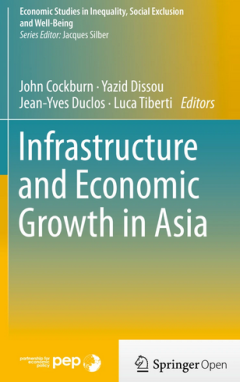Filter by

Poverty Reduction Policies and Practices in Developing Asia
Buku ini membahas tantangan kebijakan utama yang dihadapi Asia berkembang dan bagaimana wilayah ini mempertahankan pertumbuhan ekonomi yang pesat untuk mengurangi kemiskinan multidimensi melalui langkah-langkah yang sosial inklusif dan berkelanjutan secara lingkungan. Asia menghadapi banyak tantangan yang timbul akibat pertumbuhan populasi, urbanisasi yang cepat, penyediaan layanan, perubahan i…
- Edition
- -
- ISBN/ISSN
- 978-981-287-420-7
- Collation
- online resource ( Pages)
- Series Title
- Studi Ekonomi tentang Ketimpangan, Pengucilan Sosial, dan Kesejahteraan (EIAP)
- Call Number
- 362.5095 HES p

Infrastructure and Economic Growth in Asia
Pengeluaran publik untuk infrastruktur memainkan peran penting dalam mendorong pertumbuhan ekonomi dan pengentasan kemiskinan. Studi empiris menunjukkan tanpa keraguan bahwa kurangnya investasi dalam infrastruktur membatasi pertumbuhan ekonomi. Pada saat yang sama, banyak studi lain telah menunjukkan bahwa investasi dalam infrastruktur dapat menjadi alat yang sangat efektif dalam memerangi peng…
- Edition
- -
- ISBN/ISSN
- 978-3-319-03137-8
- Collation
- online resource ( IX, 148 Pages)
- Series Title
- Studi Ekonomi tentang Ketimpangan, Pengucilan Sosial, dan Kesejahteraan (EIAP)
- Call Number
- 338.91095 COC i

Counter-Terrorism, Ethics and Technology; Emerging Challenges at the Frontier…
Buku akses terbuka ini mengumpulkan berbagai kontribusi yang berupaya mengeksplorasi isu-isu etis yang muncul dari tumpang tindih antara kontra-terorisme, etika, dan teknologi. Terorisme dan respons kita mengajukan beberapa tantangan etis paling signifikan bagi negara dan masyarakat. Pada saat yang sama, kita semakin menyadari implikasi etis dari teknologi baru dan yang sedang muncul. Entah itu…
- Edition
- -
- ISBN/ISSN
- 978-3-030-90221-6
- Collation
- online resource ( XVI, 221 Pages)
- Series Title
- Ilmu Pengetahuan dan Teknologi Canggih untuk Aplikasi Keamanan (ASTSA)
- Call Number
- 363.325 HEN c

Towards Bayesian Model-Based Demography; Agency, Complexity and Uncertainty i…
Buku akses terbuka ini menyajikan pendekatan inovatif untuk mengembangkan fondasi mikro untuk studi demografi dan migrasi. Ini menawarkan metodologi unik dan novel untuk menciptakan model berbasis agen yang berlandaskan empiris untuk migrasi internasional - salah satu proses populasi yang paling tidak pasti dan merupakan area kebijakan dengan prioritas tinggi. Buku ini membahas secara rinci pro…
- Edition
- -
- ISBN/ISSN
- 978-3-030-83039-7
- Collation
- online resource ( XXV, 263 Pages)
- Series Title
- Prospek Metodologis dalam Ilmu Sosial (METH)
- Call Number
- 300.72

Methodological Investigations in Agent-Based Modelling; With Applications for…
Buku akses terbuka ini mengkaji komplikasi metodologis dari penggunaan konsep ilmu kompleksitas dalam domain ilmu sosial. Bab-bab pembuka membawa pembaca dalam tur melalui perkembangan metodologi simulasi di bidang kehidupan buatan dan biologi populasi, lalu menunjukkan meningkatnya popularitas dan relevansi metode-metode ini dalam ilmu sosial. Setelah analisis mendalam tentang potensi dampak m…
- Edition
- -
- ISBN/ISSN
- 978-3-319-72408-9
- Collation
- online resource ( XXIII, 235 Pages)
- Series Title
- Prospek Metodologis dalam Ilmu Sosial (METH)
- Call Number
- 300.1 SIL m

Researching Elites and Power; Theory, Methods, Analyses
Buku akses terbuka ini menjelaskan bagaimana studi elite secara teoretis dan metodologis membangun objek mereka, yaitu bagaimana konseptualisasi spesifik tentang elite diubah menjadi praktik penelitian menggunakan berbagai metode untuk mengumpulkan, menangani, dan menganalisis data empiris. Bagian pertama dari empat bagian berfokus pada apa yang disebut Mills sebagai elite kekuasaan dan mencaku…
- Edition
- -
- ISBN/ISSN
- 978-3-030-45175-2
- Collation
- online resource ( XII, 276 Pages)
- Series Title
- Prospek Metodologis dalam Ilmu Sosial (METH)
- Call Number
- 305.5 DEN r

Forest Bioeconomy and Climate Change
Volume akses terbuka yang diedit ini mengeksplorasi peran bioekonomi hutan dalam menangani perubahan iklim. Para penulis memberikan fokus khusus pada batasan planet dan bagaimana ekonomi linier yang berorientasi pada pertumbuhan terhubung dengan perubahan iklim dan degradasi lingkungan. Produk berbasis bio dan jalur produksi yang berkelanjutan telah dikembangkan, tetapi bagaimana mereka dapat d…
- Edition
- -
- ISBN/ISSN
- 978-3-030-99206-4
- Collation
- online resource ( XVIII, 257 Pages)
- Series Title
- Mengelola Ekosistem Hutan (MAFE)
- Call Number
- 333.7511 HET f

Non-Equilibrium Social Science and Policy; Introduction and Essays on New and…
Tujuan keseluruhan dari buku ini, yang merupakan hasil dari proyek FP7 FET Open NESS Eropa, adalah untuk memberikan kontribusi pada upaya yang sedang berlangsung untuk menempatkan ilmu sosial kuantitatif pada pijakan yang tepat untuk abad ke-21. Fokus utamanya adalah ekonomi, dan implikasinya terhadap pembuatan kebijakan, di mana pendekatan tradisional yang masih dominan semakin sulit untuk men…
- Edition
- -
- ISBN/ISSN
- 978-3-319-42424-8
- Collation
- online resource ( VIII, 232 Pages)
- Series Title
- Memahami Sistem Kompleks (UCS)
- Call Number
- 330.1 JOH n

Systemic Risk and Complex Networks in Modern Financial Systems
Buku akses terbuka ini adalah eksplorasi yang inovatif tentang risiko sistemik dalam sistem keuangan modern. Melalui investigasi teoretis dan empirisnya, buku ini mengungkap multidimensionalitas risiko sistemik, saluran transmisi krisis, dan keterkaitan antara risiko fisik, transisi, dan finansial. Ini memperkenalkan metodologi mutakhir, termasuk model prediksi dan optimisasi yang didasarkan pa…
- Edition
- -
- ISBN/ISSN
- 978-3-031-64916-5
- Collation
- online resource ( XXIII, 412 Pages)
- Series Title
- Jendela Ekonomi Baru (NEW)
- Call Number
- 332.1 PAC s

European Language Equality; A Strategic Agenda for Digital Language Equality
Buku akses terbuka ini menyajikan kumpulan komprehensif hasil proyek European Language Equality (ELE), agenda strategis, dan peta jalannya dengan rekomendasi penting kepada Uni Eropa tentang cara mencapai kesetaraan bahasa digital di Eropa pada tahun 2030. Lanskap linguistik Uni Eropa terdiri dari 24 bahasa resmi dan lebih dari 60 bahasa daerah dan minoritas. Namun, hambatan bahasa masih mengha…
- Edition
- -
- ISBN/ISSN
- 978-3-031-28819-7
- Collation
- online resource ( XXXIV, 412 Pages)
- Series Title
- Teknologi Kognitif (COGTECH)
- Call Number
- 303.4833 REH e
 Computer Science, Information & General Works
Computer Science, Information & General Works  Philosophy & Psychology
Philosophy & Psychology  Religion
Religion  Social Sciences
Social Sciences  Language
Language  Pure Science
Pure Science  Applied Sciences
Applied Sciences  Art & Recreation
Art & Recreation  Literature
Literature  History & Geography
History & Geography